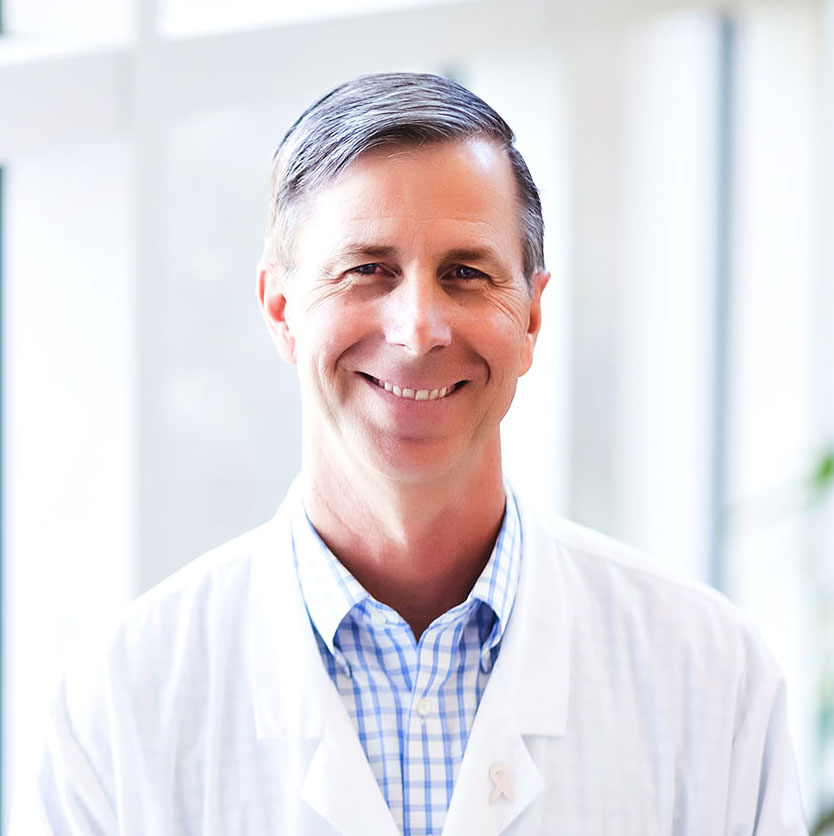COVID-19 concerns for a cancer patient
April 24, 2020

Second in our series of stories regarding COVID-19 and high-risk patients, we spoke to radiation oncologist Stephen Nigh, M.D. who is Medical Director of Oncology Services at Northwest Community Healthcare (NCH). Dr. Nigh shared information for cancer patients and their loved ones in light of the pandemic.
Some cancer patients are receiving treatment during the pandemic while others have been put in a holding pattern. It is important to know that all cancer patients are unique, from their cancer type to what stage their diagnosis is to their age, family history and their own past medical history.
“As unique as every individual is, we at NCH work as a team to personalize their cancer treatment plan,” says Dr. Nigh.
Each individual patient case is reviewed weekly by NCH’s tumor board, a multidisciplinary team of doctors, nurses and other healthcare providers who are experts in their respective specialties. They meet to discuss each patient’s diagnosis and medical history, review recent imaging tests and biopsy results, research options, weigh clinical trials available and offer recommendations aimed at eliminating cancer and preserving healthy tissue.
Early in the pandemic, NCH opted to postpone elective surgeries and those that were not necessary to be performed immediately as lifesaving procedures.
“In an effort to preserve resources for the anticipated rise in COVID-19 patients, the medical and administrative leadership at the hospital acted swiftly early in the pandemic in March. This allowed the staff to both care for COVID-19 patients and limit the risk of exposure to the virus, especially to the more vulnerable patients,” shares Dr. Nigh.
This allowed us to properly redirect resources, both in clinical staff and supplies, to establish procedures for the incoming surge of COVID-19 patients. Based on the tumor board’s direction, decisions about individual surgeries and other procedures are based on the goal of providing the best possible care for the patient while taking appropriate precautions to limit his or her risk.
Also postponed during this time are screening mammograms, colonoscopies and screening CT scans for lung cancer.
In some cases, cancer patients have been put on other treatment protocols (e.g., chemotherapy, radiation therapy or a combination of treatments) that continue to fight the disease even when surgery is not recommended at this time.
Cancer patients that have recently had surgery, have recovered from pneumonia or are actively in treatment with radiation and/or chemotherapy must take extra precautions because they are at a higher risk for worse outcomes. Their weakened immune systems are much more susceptible to the dangers of COVID-19. Standard procedures like social distancing, proper handwashing and wearing a mask are critical to protecting these patients.
According to the Centers for Disease Control and Prevention, people with COVID-19 have had a wide range of symptoms reported―ranging from mild symptoms to severe illness.
These symptoms may appear two to 14 days after exposure to the virus:
- Fever
- Cough
- Shortness of breath or difficulty breathing
- Chills
- Extreme fatigue
- Muscle pain
- Headache
- Sore throat
- New loss of taste or smell
If current cancer patients believe they have been exposed to the virus, they should first talk to their primary care physician by phone. The doctor can evaluate the patient’s individual condition and determine appropriate care. Remember, not all positive cases will require hospitalization, and it’s best to avoid the risk of spreading the virus. Therefore, many patients will be asked to quarantine at home until they recover, while staying in touch with their primary care physician as needed.
Clearly, the COVID-19 pandemic has reiterated our commitment to taking the best possible care of patients and our community who entrust us with their healthcare. From the receptionist to the nurse, therapist and physician, we are here for you to help you navigate this stressful time. We look forward to partnering with you in achieving both your and our community’s best health.
Special thank you to Dr. Nigh and the entire Oncology Services Team for helping keep our cancer patients safe during these extraordinary times.